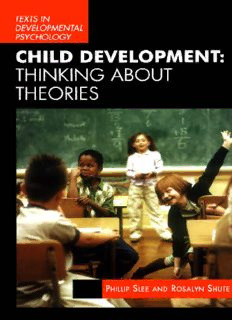Table Of ContentTexts in developmental psychology
Series Editor:
Peter Smith
Goldsmiths College, University of London
ALSO IN THE TEXTS IN DEVELOPMENTAL PSYCHOLOGY SERIES:
THE CHILD AT SCHOOL
Peter Blatchford and Anthony Pellegrini
ATTACHMENT AND DEVELOPMENT
Susan Goldberg
FRIENDS AND ENEMIES
Barry H. Schneider
Child Development:
Thinking About Theories
Phillip T. Slee
School of Education, Flinders University, Adelaide
Rosalyn H. Shute
School of Psychology, Flinders University, Adelaide
First published in Great Britain in 2003 by
Arnold, a member of the Hodder Headline Group,
338 Euston Road, London NW1 3BH
http://www.arnoldpublishers.cotn
Distributed in the United States of America by
Oxford University Press Inc.
198 Madison Avenue, New York, NY10016
© 2003 Phillip Slee and Rosalyn Shute
All rights reserved. No part of this publication may be reproduced or
transmitted in any form or by any means, electronically or mechanically,
including photocopying, recording or any information storage or retrieval
system, without either prior permission in writing from the publisher or a
licence permitting restricted copying. In the United Kingdom such licences
are issued by the Copyright Licensing Agency: 90 Tottenham Court Road,
London W1POLP.
The advice and information in this book are believed to be true and
accurate at the date of going to press, but neither the authors nor the publisher
can accept any legal responsibility or liability for any errors or omissions.
British Library Cataloguing in Publication Data
A catalogue record for this book is available from the British Library
Library of Congress Cataloging-in-Publication Data
A catalog record for this book is available from the Library of Congress
ISBN 0340 808179 (hb)
ISBN 0340 808187 (pb)
12345 67 89 10
Typeset in 10 and 13pt Plantin by Dorchester Typesetting Group Ltd
Printed and bound in Great Britain by MPG Books Ltd, Bodmin, Cornwall
What do you think about this book? Or any other Hodder Arnold title?
Please send your comments to [email protected]
Contents
List of figures and tables vii
Preface ix
1 Ways of knowing about development 1
2 From Darwin to DNA: biologically based theories
of development 26
3 A rainbow is more than the sum of its colours: beginnings
of organicism 45
4 The child as philosopher 60
5 From Oedipus to attachment: the Freudian legacy 80
6 Mechanism: the whole is equal to the sum of its parts 97
7 Dialecticism: the child developing in a social world 113
8 The historic event: contextualism 125
9 Sociocultural influences on development 136
10 Listening to different voices: feminism and developmental
psychology 151
11 Putting it all together: towards theoretical integration 165
12 From theory into practice 184
Appendix 1: Some historical milestones relevant for developmental
psychology 195
Appendix 2: Discussion questions, activities and selected websites 198
Glossary 204
References 208
Index 228
This page intentionally left blank
List of figures and tables
Figures
1.1 'Images' of children as influenced by history, culture and
the philosophy of science 18
3.1 The visual illusion of the Ames window 47
3.2 Examples of developmental tasks 57
6.1 A simplified model of information processing 108
9.1 Maori model of human development 148
Tables
2.1 Evolutionary developmental theory: evolved domains
of mind 33
This page intentionally left blank
Preface
This book is part of a series that addresses a range of theoretical and
applied issues in developmental psychology. Our purpose is to provide a
broad overview of theories of child development, although practice is
certainly not neglected. As well as being academic psychologists, we have
strong professional interests: Phillip has a background in teaching, edu-
cates student teachers and has produced internationally utilized materials
to address school bullying; Rosalyn is an experienced coordinator of
professional postgraduate psychology programmes and provides clinical
psychology services to young people and their families. Most of our publi-
cations address applied issues. At first sight, then, it is perhaps a little
curious that a book on theories of child and adolescent development
should be written by two people whose primary interests are applied.
However, we take a holistic approach to our work, and see theory as
underpinning all aspects of it, including research, teaching and profession-
al practice. We therefore considered it important to include a chapter on
the implications of theory for practice, especially given the primary reader-
ship of the book (higher-level undergraduates, honours students and
postgraduates), who are at the stage of considering the connections
between their undergraduate education and future career plans.
We also considered it important to have some empirical basis for
decisions about how to structure the book. As well as drawing upon the
developmental literature, guidance from the series editor and book
proposal referees, and our own experience with writing texts, we held a
focus group of honours psychology students at our university to ask them
what they would like to see in a book such as this. One of their main issues
was that they wanted to gain an overall picture of various theories and how
they fitted together, in contrast to the fragmented image they felt they had
gained as undergraduates. We have therefore attempted to make some
explicit historical and theoretical links between different schools of
thought. They also felt that the university culture of critique left them with
only a sense of 'what was wrong' with various theoretical approaches, and
they also wanted to know 'what was right' with them. They asked to see
examples of the implications of theory for practice, which accorded well
with our own conception of the book, and reported being put off by too
much abstract writing without examples and too many pages of unbroken

